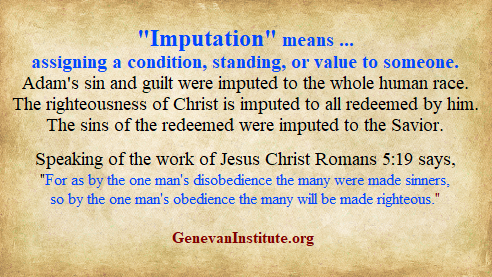A Tragic Trade
Studies In Paul’s Letter to the Romans
by Bob Burridge ©2011
Lesson 08: Romans 1:18-32
We live in an age where electronics has given
us an amazing window on the world.
Television takes us to wars, scenes of crime, breaking news, and spectacular events. It provides us with an unlimited stream of mesmerizing entertainment interweaving carefully constructed messages about morality and life styles. Magazines and newspapers are able to produce sensational stories with overwhelming speed and influence. The Internet puts millions of pages of information at our fingertips and lets us talk with people all around the world at any time for as long as we want.
The rapid explosion of information, and the immediate connections we have today with so many, make us all the more aware and alarmed with the overflow of wickedness from fallen hearts, and it makes us all the more easily influenced by the dangerous standards and attitudes of the world.
This world that so closely surrounds us is sinking deeper and deeper into sin and depravity. With each generation the limits are pressed just a little farther.
Today, many no longer see governing over a nation, state, or town as a special trust. Constitutionally, leaders were to take time away from a career to represent the people. However, the drift in values has created an opportunists dream, and a nightmare for liberty. Some professional politicians consider it their job to manipulate the people greedily for personal wealth, power to promote their own causes, as a boost for their ego. Deceit and corruption to one degree or another are found in every party and at every level of society. Those few who still try to govern by our founding principles often find themselves losing elections.
Much of the worship in our modern society is not like the worship God has prescribed in Scripture. It has become either entertainment to attract a large audience, mystical rituals to soothe the emotions and divert the mind, a time for promoting political and social theories, or to some worship is ignored or neglected altogether.
The increased power of the individual to control the world around him has crated opportunities for brutal violence. Aggressive drivers run law abiding drivers off the road, and have even shot them. In the video game Carmageddon, you drive various cars through cities and stores to chase down pedestrians to run them over. The game provides painful cries and graphic displays of blood and mangled bodies. Points are earned by hitting and killing various kinds of people as they frantically try to run away with looks of terror on their faces.
Children have shot other children in our schools and neighborhoods. Sexual perversion has made the morality of Scripture something either to ridicule, or to hate. Sex outside of marriage has become so common and expected, that people often smirk with condescension at the mention of God’s commandments. Homosexuality has become a specially protected life-style under the law with special privilege. Homosexuals demand that we have no right to our own views and values. They demand under law that we must recognize marriages between same-sex couples and their right to adopt and raise children training them in their life style. Pornography (the portraying of sexually explicit material) is not only found in strip bars, adult magazines, and X-rated movies. It is there for all to see on network television, the Internet, PG and PG-13 movies, and magazines aimed at teens.
A tragic trade has taken place. The good things God has built into the human race are exchanged for perversions. The spiral into corruption goes down one more level with each generation of any given society.
When fallen man exchanges what is good and right, for what is bad and wrong, what does God do? Does he send fire from heaven? disease and plagues? death and poverty? That is not what it says in the Bible. It says that God gives them over to exactly what they wanted. We see the results choking the world we live in. There is an old saying, “be careful what you ask for … you may get it”
In our last study we saw that there is no excuse — no one can plead ignorance. God is clearly revealing himself in all the things that he made (Romans 1:20). Man suppresses that truth and refuses to see it (1:18). This leaves him inexcusable for his ungodliness (1:19,20).
Verses 21-25 show how the heart of fallen humanity deals with this clear testimony. In arrogant pride the fallen creature dares to stand as judge over his Creator. He runs to do things that offend God. He believes things contrary to what God has revealed. He uses God’s gifts as if they were things he either deserves or has secured on his own.
There are two principles summarized in this last section of Chapter One of the Book of Romans.
1. Fallen man makes an exchange: he prefers distorted truth over reality.
2. God justly gives fallen man over to his own corrupt ways.
1. Mankind in his fallen condition makes a tragic trade.
As we saw in our last study: The fallen nature of man suppresses the truth he sees in things, and foolishly prefers a distorted way of looking at God and what God made. Verse 25 mentions this exchange directly.
Romans 1:25, “… who exchanged the truth of God for the lie, and worshiped and served the creature rather than the Creator, who is blessed forever. Amen”
The true worship of God is switched for the worship of the things God made. Paul goes on to describe this exchange as it relates to moral behavior. A wrong view of God always shows up in wrong living. The first issue that he brings up is fallen man’s confused attitude toward sex.
Romans 1:26-27, “For this reason God gave them up to vile passions. For even their women exchanged the natural use for what is against nature. Likewise also the men, leaving the natural use of the woman, burned in their lust for one another, men with men committing what is shameful, and receiving in themselves the penalty of their error which was due.”
Fallen humans tend to exchange proper sexual desires for perverted ones. Sex is one of the strongest drives God has put into us. It is to be satisfied in only one way morally and with God’s blessing: one man and one woman united for life as husband and wife. Any sex outside of that union is condemned as a perversion of God’s creation order.
Paul uses an extreme example to illustrate this principle. He describes homosexuality. This was a growing practice in the ancient Roman Empire. First he deals with women looking to other women for sexual satisfaction. Then he deals with men who have sexual desires for other men. This is never presented in Scripture as an alternative life-style. It is contrary to the way God made us, and is a deep offense to him. These actions are called “shameful” [ασχημοσυνη (aschaemosun), “indecent”]. The practice and desire is called “error.” This is the progression God warns us will happen when we abandon his ways.
Since God condemns their favorite perversions, they reject God as revealed in Scripture.
Romans 1:28, “And even as they did not like to retain God in their knowledge, God gave them over to a debased mind, to do those things which are not fitting;”
What they do not like they reject. They judge everything against what they assume is right by their own standards. In their rejection, God gives them over to their depraved thinking. They rush ahead into those things that are not right.
The old King James Version says they do things which are not “convenient” The word convenient had a different meaning when the KJV was translated in 1611. Today “convenient” means things that are no strain on us, easy things that require less work. Originally it meant what goes along with something, what conforms with it. The sinner does the things that do not go along with what God says is right.
Then Paul gives a summary list of the sins they love both to do and to defend. Their lives are filled up with them. It is their life-style. They are obsessed with such things. Different translations may choose different English words. But the meanings are clear.
Romans 1:29-31, “being filled with all unrighteousness, sexual immorality, wickedness, covetousness, maliciousness; full of envy, murder, strife, deceit, evil-mindedness; they are whisperers, backbiters, haters of God, violent, proud, boasters, inventors of evil things, disobedient to parents, undiscerning, untrustworthy, unloving, unforgiving, unmerciful;”
Those who are given over to their own depravity are filled with unrighteousness [ἀδικία (adikia), “injustice”]. They care only for their own advancement. If a judgment serves them personally, then they see justice as being served. They care little for victims who suffer losses so that they can gain.
They love all sorts of sexual immorality [πορνεία (porneia)]. Most ancient manuscripts use this word for a broad range of sexual activities. Biblically it is used for all sexual conduct outside of a proper marriage bond. This would include sexual activities between unmarried people, as well as adultery committed by someone who is married.
They engage in wickedness [πονηρία (ponaeria)]. This is the disposition that leans toward doing things that are wrong, contrary to what God says is right and moral.
They are covetousness, greedy [πλεονεξία (pleonexia)]. This is that self-serving motive that leads people to covet what they don’t have. They grumble when they lack something. They act as if they have a right to things others have. They are likely to take advantage of others in business, even of their friends. They are not only greedy for financial gain, that may not be everyone’s evil motive. Some maliciously want to promote their own ideas or ways of life, or they want power or respect. Whatever it is that motivates them, they will not care if the liberty, safety, or peace of others is violated, as long as they get that for which they crave.
They are maliciousness, evil [κακία (kakia)]. This is the attitude of those not troubled by seeing people injured. They accept the suffering of others as the inevitable cost of their own advancement.
They are full of envy [φθόνος (phthonos)]. They jealously long for things others have. At the root is a discontent with what God has given them. They fail to see the value of what they have. They only see the value of things they don’t yet possess.
They tend toward murder [φόνος (phonos)]. Even the lives of others will not stand in the way of their personal peace and prosperity.
They are also full of strife [ἔριδος (eridos)]. They are contentious, arguing, and debating in a most demanding manner.
They have no problem with deceit [δόλος (dolos)]. The word here originally meant the bait you use in a trap to catch an animal. The animal sees what appears to be a good meal, but it was there to lure its victim into a hidden trap. These people Paul is describing will deceive, lie, or commit fraud to get what they want from others. They entice people only to take advantage of them.
They are filled with evil-mindedness [κακοηθεία (kakoaetheia), “malice”]. This is a disposition which is gloomy and mean.
These are whisperers [ψιθυριστάς (psithuristas), “gossipers”]. They secretly spread stories that hurt other people. Their intention is to appear superior to those about whom they gossip, or to use the gossip to get others to pay attention to them.
They are backbiters [καταλάλος (katalalos), “slanderers”]. This is when they say hurtful things about others. It is a compound word literally meaning to “speak against”.
They are haters of God [θεοστυγης (theostugaes)]. They have no love at all for God as he is revealed in Scripture. They not only invent a god in a form of their own liking, they actually despise and ridicule the biblical teachings about God.
They are violent [ὑβριστης (hubristaes), more accurately “insulting”, “insolent”]. These show no respect for other people. They put themselves first. Our English word “hubris” comes directly from this ancient Greek word. The Merriam-Webster dictionary defines “hubris” as, “exaggerated pride or self-confidence”
They are proud [ὑπερηφάνος (huperaephanos), “arrogant”]. These are those who think they are better than everyone else. They are the center of their own attention, and want to be the center of everyone else’s attention too.
They are boastful [ἀλαζων (alazon)]. Those are the ones who love to brag and to tell others about their accomplishments.
They are inventors of evil things [ἐφευρετὰς κακῶν (epheuretas kakon), “inventors of evil”]. They are always scheming ways to justify their immorality.
They are disobedient to their parents [γονεῦσιν ἀπειθεῖς (goneusin apeitheis)]. If authority structures break down in the home, it will produce disrespect in business, in the community, in the church, and wherever someone is held responsible for overseeing things.
They are undiscerning [ἀσυνετος (asunetos), “without understanding”]. This does not mean they have a low IQ, or that they do poorly in school. It means they have no comprehension in spiritual or moral matters.
They are untrustworthy [ἀσυνθέτος (asunthetos)]. The word means they cannot be relied upon. They have little regard for promises or vows. The word was often used for those who were covenant breakers.
They are unloving [ἀστόργος (astorgos)]. These have no natural affection for family or friends, no loyalties.
They are unforgiving [ἀσπονδος (aspondos)]. The word literally means “without a poured out drink offering.” This was normally part of the making of treaties and truces. It refers those who will not be reconciled with others. They are unforgiving, and will not come to agreements to settle differences.
They are unmerciful [ἀνελεήμων (aneleaemon)]. These are they who show no compassion, mercy, or pity.
* (See the literary note at the end of this lesson.)
These traits never stand alone. They stand in support of others who are the same.
Romans 1:32, “who, knowing the righteous judgment of God, that those who practice such things are deserving of death, not only do the same but also approve of those who practice them.”
They know such things are wrong, but look for company in their sins. They love to have others go along with them. They are the ones who would quote numbers as if large numbers agree, that makes it right.
2. God justly gives fallen man over to his own corrupt ways.
Throughout this sections it shows that God gives these unbelievers over to believe the lie (1:25). In their lusts they are left to their own to impurity, to the dishonoring of their own bodies (1:24). They are given over to degrading passions (1:26), and are left to their depraved minds to do what is improper (1:28).
God abandoned them to this level of corruption on the basis of their rebellion, both the rebellion they inherited from Adam, and their own sins that flow from that depraved soul. When God gives them up it is deserved. It is a judgment. It is their rightful punishment. Corrupt people get to live in the consequences of their own rebellion.
They are alone held responsible for their depravity, not God. However, God has a holy purpose in allowing it to be this way. The depravity of man is such that God is not bound ever to hold back man’s sin. If from Eden on God restrained no sin, there would be no injustice at all. However, to reveal the depth of man’s depravity, and to reveal his own justice, holiness, mercy, and grace, God permits them to have their own sinful ways. He allows them to fall deeper and deeper into depravity. They sin most willingly, and want to do it more and more. The abandonment to their flood of corruption is judicial, caused and earned by sin.
Some point out the corruption around us and say, “look at the violence, the sexual perversity, the corruption, the lies. God will judge us for this!” They are partly right. But according to the principles of Scripture, this is a sign that God’s judgment is already here! The evil they see is part of that on-going judgment.
If the heathen who only know God by creation and their conscience are judged in this way, then how horrible for those who know his word yet prefer the perverted things. This same principle applies to the covenant people of God. To his people Israel God said in Psalm 81:11-12, “But My people would not heed My voice, And Israel would have none of Me. So I gave them over to their own stubborn heart, To walk in their own counsels.” In Proverbs 8:36 God says, “But he who sins against me wrongs his own soul; All those who hate me love death.”
The Lord calls out to his children to see the danger and to turn back in sincerity, trusting in his deliverance. Psalm 81:13 says, “Oh, that My people would listen to Me, That Israel would walk in My ways!”
In those who turn to him he reveals the work of Christ, the promised Messiah, upon their hearts. Their sin, their guilt, and its power were dealt with on the cross in their place. He promises to restore the repentant so that again he will restrain sin among them and bless them. Psalm 81 ends with these words in verses 14-16, “I would soon subdue their enemies, And turn My hand against their adversaries. The haters of the LORD would pretend submission to Him, But their fate would endure forever. He would have fed them also with the finest of wheat; And with honey from the rock I would have satisfied you.”
In those who do not turn back, who do not repent, who do not rest in Christ, God reveals that they were never truly his. As Jesus said in Matthew 7:23, “And then I will declare to them, ‘I never knew you; depart from Me, you who practice lawlessness!’ ”
God abandons them to the horrors of his judgments. He gives them over to suffer in the sins they seemed to want. There they suffer the miseries of sin in this life, and face the horrible reality of eternal sufferings from which there is no relief or comfort.
This is the lesson Paul teaches us in this section of Romans
Fallen people exchange right things for wrong things, fantasizing that they will be satisfied by them. However, they are in rebellion against the God of the universe. This is a most frightening condition. At some point, God gives them over to the desires of their own hearts.
Instead of finding satisfaction and freedom, they find the horrors of living in a corrupt society. They find that the perverted things do not bring true inner peace and happiness. They search for more options for satisfaction in all the wrong ways, and show the evidences of their abandonment to sin. In those who persist in sin, God reveals his justice, and their own guilt. By contract, in those who repent and turn to the provision for forgiveness in Christ, God reveals his mercy and amazing grace.
Though believers must also live in the corrupt society brought down by society’s sins, they find in the midst of it the comfort of God. They enjoy peace in the church, and security in their homes. They are called to spread that promise of inner peace through the gospel of grace. They are to bear testimony to it in their places of work, among their friends, and in their communities.
God’s blessing always accompanies the obedience of faith in his promises. Our obedience is never the cause or foundation for our blessings, it is the means God uses by which his blessings are dispensed. The cause is always God’s grace. The foundation is always the work of Jesus the Redeemer. By covenant, God promises to honor his work in our hearts by granting the covenant blessings to those transformed by the life and death of the Savior.
We may not live in an age where masses will turn from sin and repent. There have been such times, and in God’s plan they may occur again. However, in our own obedience we tap the wonderful and endless resource of God’s promised blessings in whatever situation we find ourselves.
________________
* Literary Note: Notice the poetic structure of how Paul arranged these words in verses 29-31. They are in groups with similar or contrasting sounds. Read the Greek words out loud and notice the patterns used in some places as a literary effect.
unrighteousness (injustice) – sexual immorality – wickedness – maliciousness
ἀδικία – πορνεία – πονηρία – κακία
adikia – porneia – ponaeria – kakia
envy – murder – strife – deceit
φθόνος – φόνος – ἔριδος – δόλος
phthonos – phonos – eridos – dolos
evil-mindedness (malice) – whisperers (gossippers) – backbiters (slanderers) – haters of God
κακοηθεία – ψιθυριστάς – καταλάλος – θεοστυγης
kakoaetheia – psithuristas – katalalos – theostugaes
violent (insolent) – proud (arrogant) – boastful – inventors of evil – disobedient to parents
ὑβριστης – ὑπερηφάνος – ἀλαζων – ἐφευρετὰς κακῶν – γονεῦσιν ἀπειθεῖς
hubristaes – huperaephanos – alazon – epheuretas kakon – goneusin apeitheis
undiscerning – untrustworthy – unloving – unforgiving – unmerciful
ἀσυνετος – ἀσυνθέτος – ἀστόργος – ἀσπονδος – ἀνελεήμων
asunetos – asunthetos – astorgos – aspondos – aneleaemon
(The Bible quotations in this lesson are from the New King James Version of the Bible unless otherwise noted.)
Back to the Index of Studies In Paul’s Letter to the Romans








